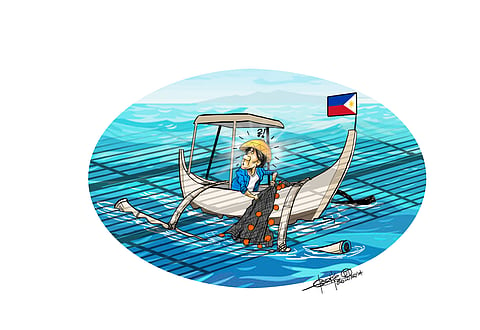
- NEWS
- the EDIT
- COMMENTARY
- BUSINESS
- LIFE
- SHOW
- ACTION
- GLOBAL GOALS
- SNAPS
- DYARYO TIRADA
- MORE

The country’s allies will have a role to play in testing China’s resolve to enforce its new regulation in which it threatens to arrest “trespassers” in the West Philippine Sea.
“It is time for the allies to sail and find out if China will try to make an arrest,” suggests retired Associate Justice Antonio Carpio.
The mysterious edict which came out only in China’s mouthpiece publications indicated that beginning 15 June, the Chinese Coast Guard will enforce its nine-dash line claim by arresting and detaining “trespassers.”
Carpio said the new regulation is inconsistent with the United Nations Convention on the Law of the Sea, which the Philippines can raise before the UNCLOS tribunal. Both the Philippines and China are signatories to UNCLOS.
Carpio said the international maritime legal framework bars China from undertaking enforcement activities in the Philippines’ exclusive economic zone (EEZ).
The arbitral award of 2016 affirmed the country’s entitlement, as provided in UNCLOS, over the 200 nautical miles of EEZ starting from the baselines of the Philippines.
Carpio stressed that no one can stop Filipino fishermen from enjoying their livelihood. “The term exclusive that applies to the country’s economic zone means that only Filipinos should benefit from the resources in the area,” Carpio pointed out.
If China stops Filipinos from fishing within the EEZ, if they are arrested or detained, the government can file a case with the International Tribunal for the Law of the Sea (ITLOS), according to Carpio.
ITLOS is where disputes arising from the interpretation of UNCLOS provisions are adjudicated.
The body has the authority to order China to stop implementing laws that conflict with international convention.
Such an order is guaranteed since it is consistent with the ruling of the arbitral tribunal which clearly states that the Philippines has a right to the resources in its EEZ.
While China does not recognize the arbitral award, each time the Philippines undertakes a joint patrol with the United States and other allied nations under the principle of freedom of navigation, China is reminded that it does not have a right to the area.
Carpio said the continued operation of ships of the major powers hinders China from taking over the WPS based on its invalidated nine-dash line claim.
The country’s allies sailing in the WPS is the strongest form of enforcement of the Permanent Court of Arbitration ruling.
“They will continue to sail in the WPS and they will continue to tell China that this is not your property and you can attempt to arrest us,” Carpio said.
Carpio issued a counter-warning to China: “The Chinese Coast Guard’s regulation is empty and it would not be enforced. They may start arresting the small fishermen but if they do that the Philippines will have an opportunity to go to the UNCLOS tribunal.”
The situation will become volatile if they attempt to detain the Philippine Coast Guard (PCG), he said.
“It would be a different thing since the PCG will not allow that and an armed confrontation is possible. If China starts using lethal weapons then the Mutual Defense Treaty will be triggered, which China has been avoiding,” Carpio continued. “Beijing does not want to give the US an excuse to intervene.”
The enforcement part of the landmark 2016 decision is possible despite earlier views that the award does not have any value because of the absence of an enforcement body.
Pressure from the community of nations can be brought to bear on China to comply with international norms.
